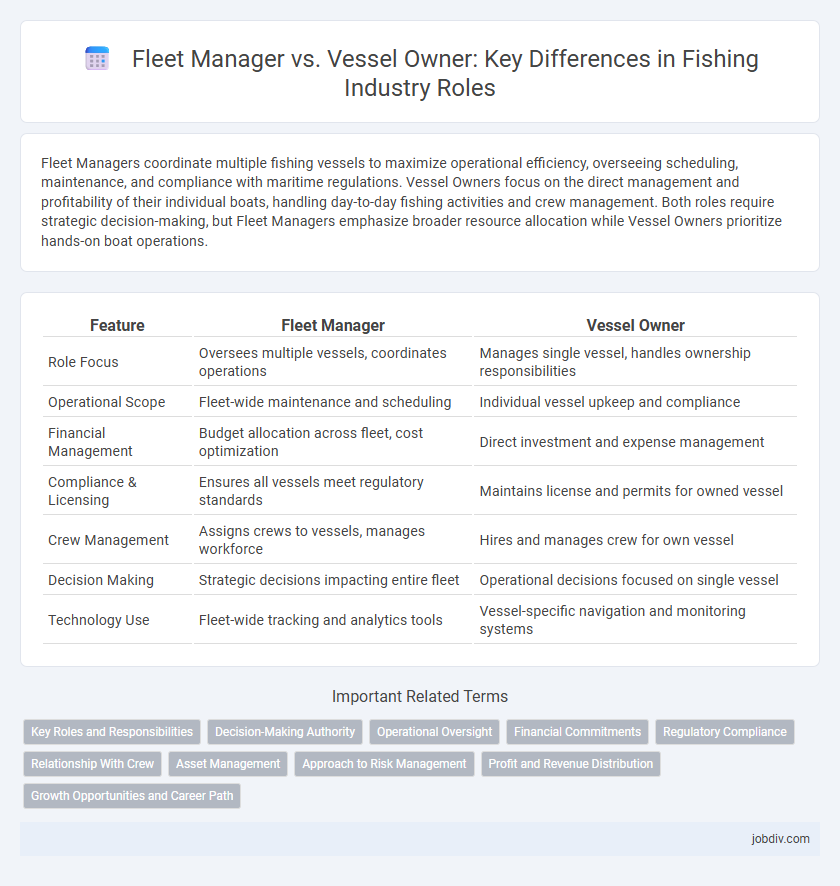Fleet Managers coordinate multiple fishing vessels to maximize operational efficiency, overseeing scheduling, maintenance, and compliance with maritime regulations. Vessel Owners focus on the direct management and profitability of their individual boats, handling day-to-day fishing activities and crew management. Both roles require strategic decision-making, but Fleet Managers emphasize broader resource allocation while Vessel Owners prioritize hands-on boat operations.
Table of Comparison
| Feature | Fleet Manager | Vessel Owner |
|---|---|---|
| Role Focus | Oversees multiple vessels, coordinates operations | Manages single vessel, handles ownership responsibilities |
| Operational Scope | Fleet-wide maintenance and scheduling | Individual vessel upkeep and compliance |
| Financial Management | Budget allocation across fleet, cost optimization | Direct investment and expense management |
| Compliance & Licensing | Ensures all vessels meet regulatory standards | Maintains license and permits for owned vessel |
| Crew Management | Assigns crews to vessels, manages workforce | Hires and manages crew for own vessel |
| Decision Making | Strategic decisions impacting entire fleet | Operational decisions focused on single vessel |
| Technology Use | Fleet-wide tracking and analytics tools | Vessel-specific navigation and monitoring systems |
Key Roles and Responsibilities
Fleet managers coordinate daily operations, ensuring vessel maintenance, crew scheduling, and compliance with fishing regulations to optimize productivity and safety. Vessel owners focus on strategic decisions such as investment in new vessels, budgeting, and long-term asset management to maximize profitability. Both roles require collaboration to balance operational efficiency with financial sustainability in the fishing industry.
Decision-Making Authority
Fleet managers oversee multiple vessels, making strategic operational decisions such as route planning, crew assignments, and maintenance schedules to optimize overall fleet efficiency. Vessel owners hold ultimate authority over financial decisions, investments, and compliance with regulatory requirements, influencing the broader business direction. The effectiveness of fishing operations depends on the collaborative decision-making balance between the fleet manager's tactical control and the vessel owner's strategic governance.
Operational Oversight
Fleet managers coordinate daily fishing operations, ensuring optimal vessel utilization and compliance with maritime regulations. Vessel owners primarily focus on asset management and financial investment, while delegating operational oversight to fleet managers. Effective collaboration between the two enhances catch efficiency, safety protocols, and maintenance scheduling.
Financial Commitments
Fleet managers typically handle operational expenses and maintenance budgets, ensuring cost-effective vessel performance while negotiating supplier contracts to optimize spending. Vessel owners bear larger financial commitments including capital investments, insurance, licensing, and long-term financing obligations essential for vessel acquisition and compliance. Understanding the distinct financial responsibilities helps streamline budgeting strategies and enhances fiscal accountability within the fishing industry.
Regulatory Compliance
Fleet managers ensure regulatory compliance by continuously monitoring vessel operations against maritime laws and fishing quotas, implementing real-time reporting systems, and coordinating crew training on safety and environmental standards. Vessel owners focus on securing permits, adhering to licensing agreements, and financing necessary upgrades to meet emissions and catch regulations. Both roles require collaboration to maintain sustainable practices and avoid penalties in the fishing industry.
Relationship With Crew
Fleet managers maintain a direct and consistent communication channel with the crew, ensuring operational efficiency and crew welfare through regular assessments and support. Vessel owners typically engage with the crew indirectly, relying on fleet managers or captains to handle day-to-day interactions and discipline. The collaborative dynamic between fleet managers and vessel owners is essential for balancing business objectives with crew satisfaction and productivity.
Asset Management
Fleet managers oversee the operational efficiency and maintenance schedules of multiple fishing vessels, ensuring optimal asset utilization and minimizing downtime through strategic resource allocation. Vessel owners focus on long-term investment decisions, asset depreciation, and compliance with regulatory standards to maximize the value and lifespan of each vessel in their fleet. Effective asset management in fishing operations requires collaboration between fleet managers and vessel owners to balance daily operational needs with sustainable capital investment.
Approach to Risk Management
Fleet managers implement systematic risk assessment protocols and prioritize preventive maintenance to minimize operational disruptions and enhance crew safety. Vessel owners often adopt a broader financial risk management perspective, balancing investment returns with insurance considerations and compliance with maritime regulations. Both roles require proactive strategies but differ in focus, with fleet managers emphasizing day-to-day operational risks and vessel owners concentrating on long-term asset protection.
Profit and Revenue Distribution
Fleet managers optimize fishing operations by coordinating multiple vessels, increasing overall catch efficiency and boosting collective revenue through strategic route planning and resource allocation. Vessel owners directly control individual boats, bearing higher operational costs but retaining a larger share of profits from their specific catch. Profit distribution in fleet-managed operations often involves fixed fees or revenue splits, while vessel owners rely solely on market prices and individual haul success.
Growth Opportunities and Career Path
Fleet managers in fishing operations oversee multiple vessels, providing strategic growth through resource allocation and maintenance optimization, which enhances fleet efficiency and profitability. Vessel owners pursue growth by expanding their fleets or upgrading equipment, directly influencing operational capacity and market reach. Career paths for fleet managers often advance into senior maritime logistics or operations roles, while vessel owners may transition into industry consulting or commercial fisheries leadership.
Fleet Manager vs Vessel Owner Infographic

 jobdiv.com
jobdiv.com